Speculation is that this teacher at Old Ironton School in Trigg County, Kentucky (1900) may be the same person who was the headmaster at Ferguson Springs School during the late 1930'0 or 1940's, Trigg County, Kentucky.
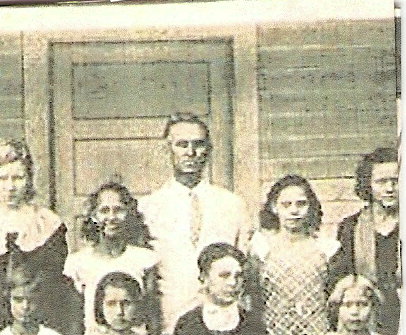
The teacher with tie- in -shirt(military style) stands amid this image. There at Ferguson Springs School, Trigg County, Kentucky. this photo was taken at some time in the 1930's or 1940's. My aunt Wilmus Avel Fulks, daughter of Carie Pinegar Fulks and Mattie Mandard Fulks, stands second to her teacher's right.
She's tall and blondhaired. This
writer has reason to suspect that the teacher may be the same schoolmaster who ruled
over Old Ironton School of 1900. Grandmother Carie Pinegar related to me that the teacher's name was Harry Smith. Was he somehow related to the famous Mormon leader John Smith?
============================================
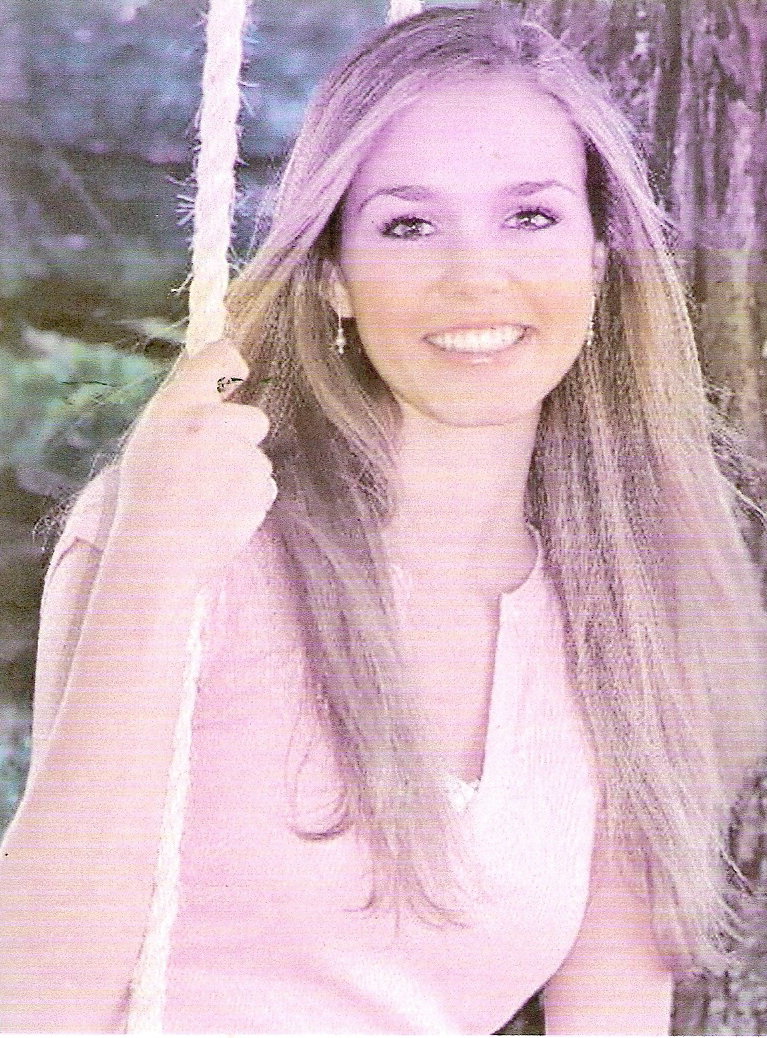
Residing with her mother and father, Mr. and Mrs A.D. Pinegar, Canada, Northwest
Territory, I have the pleasure of visiting my relative named Adrian each summer. What's incredible is her amazing musical talent. She specializes in piano and viola.
Adrian has the amazing gift of memory. She plays most of the piano classics without
music script, and she plays them well. An amazing talent! Her teacher is an Austrian who lives seventeen miles away- a refugee who fled war ravaged Europe.
=========================================================
Killed in World War I while serving as an infantryman in the United States Army was Hugh Fulks; buried in either Newby or Pinegar Cemetary. Hugh was either a cousin or nephew of my father, Rummage Ira Fulks. Frank DePriest, owner of a general store near Star Lime Works, Kentucky mentioned that Hugh, as a small child, had the habit of falling asleep, snuggled atop a cracker barrel.
===================================================================
How The Fulks Felt About The Pinegars
Term "second fiddlers" most certainly does not apply to a lack of affection and
respect for the Pinegars. Members of that Pinegar family are part of Fulks heritage resulting from a maritial union between Sara Elizabeth Depriest(1857-1924) and Benjamin Franklin Pinegar.(-------) One of Benjamin and Sara's children<Carie Atlantic Gerthie Dell) married a young man named Mattie Mandard Fulks(Rummage Fulks' father).Mattie Mandard Fulks was one of Henry Andrew Jackson Fulks II's boys.
Rummage Ira Fulks was especially fond of his grandmother "Betty" Depriest Pinegar and the other Pinegars. During our visits to Kentucky, Uncle Dyer, Uncles Lalus, his mother, and Carie Atlantic Gerthie Dell Pinegar Fulks were atop the visitation list.
Childhood experiences lend credibility to the concept that several of the close Fulks kin were extremely independent. For them, company seemed to amount to having extra mouths to feed: killing a chicken and mashing potatoes or whatever. The Pinegars were more hospitable. "Good to see you again, Rum!" the Fulks' would say. "How long are you going to stay this time?" That was often the message this writer received as a child and teenager.
Sister Martha Dorcas Fulks Hallman relayed to me that the Pinegars attending Old Ironton School of 1900 were acquainted with Henry Andrew Jackson Fulks II, his wife,
and children. It is known that the children of Mattie Mandard Fulks and Carie Atlantic Gerthie Dell Pinegar Fulks attended a school known as Old Hubbard. Another child of Mattie and Carie was Wilmus Avel Fulks, and she attended school at Ferguson
Springs from ages twelve to sixteen. What school she attended earlier is unknown.
My greatgrandmother, Sara Elizabeth Depriest, was one of two children born to
Simpson Depriest and Persilla Terry. Born in the state of Tennessee, Persilla Leonard Terry and Simpson Depriest were married in the 1855 time threshold. It is
suspected that Persilla and her family had moved from Tennessee to the vicinity of
Birmingham and Ironton, Kentucky in order for the father to work in the iron or lime industry. Perhaps they had inherited property. No one knows for certain.
Any conclusions drawn in support of this hypothesis will be corrected when and if found to be in error.
Cornelius Alexander Depriest, second child of Percilla Terry and Simpson Depriest, was born on February 1, 1861 in
Perry County, Tennessee. My ggrandmother, Sara Elizabeth Depriest, is listed as born February 9,1857
and deceased March 3, 1940.
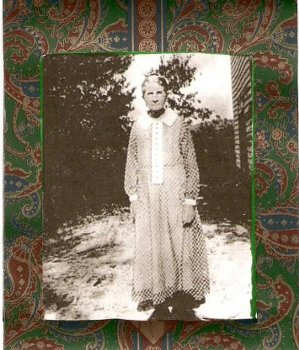
Uncle Lalus Martin Pinegar
Lalus Martin Pinegar was the youngest child and a son of Sara Elizabeth Depriest
Pinegar. Uncle Lalus was born after Benjamin Franklin Pinegar deceased. It is thought that Benjamin Pinegar deceased during 1887.
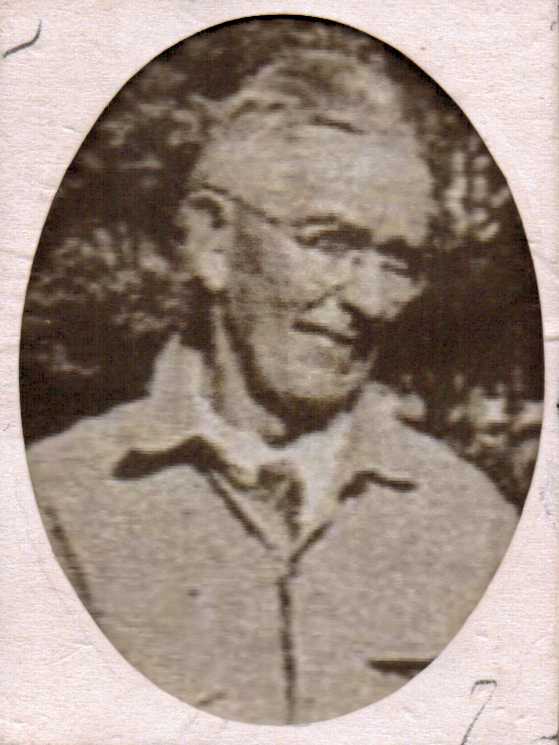
Uncle Lalus Martin Pinegar at Old Ironton School in 1900. He's the
blond; just to right of center. In his future, he'll serve in WWI.
A WWI veteran and in the U.S. Army engineers, my uncle Lalus Martin Pinegar was a
longtime resident of Grand Rivers, Kentucky; serving one term as its mayor. Nicknamed "Little Britches," my greatuncle was married to a schoolteacher:
Allie Jennings Pinegar.
Among Uncle Lalus's remnants of the World War were his gas mask,a captured wristwatch, and a gold ring taken from a German soldier: a battlefield casualty. Of all our uncles, Uncle Lalus was, no doubt, our favorite. Being of small stature, blond
haired, and blue eyed, Uncle Lalus possessed an excellent verbal facility, a bright
intellect, and a natural wit and curiosity. All the Pinegars I met shared those traits. Uncle Lalus did suffer serious mental injury from his experiences during that war, but he remained a very decent person. Few emerge from participation in war unscarred.
My uncle Lalus made it a point to emphasize during discussions of
World War I that he felt that the Germans were fine people and were among the brightest and most inventive in the world. "They just get caught-up in that kind of thing. They are called into the military, and they have to go." Uncle said.
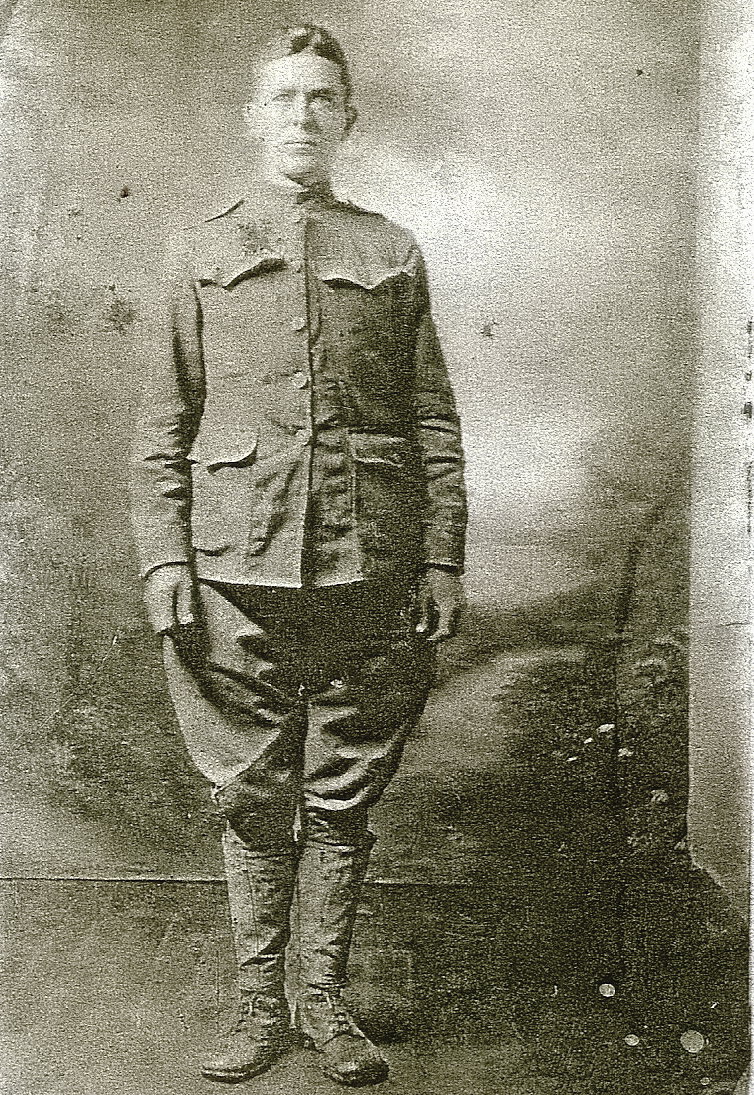 THE PHOTOS
THE PHOTOS
Somewhere in the Fulks Family Photos Archives, I've spotted a (1918) photo of Uncle
Lalus Pinegar as he stood on a muddy, road in France during the First World War. A desecrated forest suggests of a fierce artillery barrage. Treetops are missing, and within that photo, debris are scattered as far as one can see.
Said Uncle Lalus in regard to the war: "It was the darkest of nights, and I volunteered as a private
to the duty of riding in sidecart of a motorcycle. A man from New York City was the cyclist, and I was the passenger. Our mission was to deliver a "top secret" written message to General Pershing at his headquarters; made necessary for reason that the enemy had severed our lines of communication with headquarters.
That trip through German line was really scary. It was necessary that we ride top-speed through German lines, and Germans were firing at us the entire time. There were shells, small arms, and machine guns. I could hear shots whizzing over our heads and feel their wind and heat. We did make it. Gaining entry into General Sherman's tent by saluting, giving the password, passing, the message was to direct artillery fire into the Argonne Forest, send in the infantry and re-inforcements, and bring in the armor.
The tide of battle and course of the war were changed. The enemy began to surrender in large numbers, and fortunately, the motorcycle operator and I made it to the General's headquarters and back to our lines without being killed. I never saw that man from New York again. He may not have survived that war."
Until his health began to deteriorate in his fifties, Uncle Lalus was happy
to accompany my dad and me when fishing for hybrid-striped bass on Kentucky Lake and
on trips between the rivers. It was not long until Uncle Lalus's respiratory problems due to smoking, inhaling of coal dust, and his inhaling of small amounts of
poisonous gas during the world war that Uncle Lalus was not in condition to drive his automobile or accompany us. Uncle Lalus was upset by the TVA's
acquisition of all the land between the rivers. Considering such land acquisition
a national trend towards socialism, he was perturbed upon encountering visitors to the area. Uncle Lalus feared the emergence of the nation toward a socialist state.
MR. POPE OF WAGGONER, ILLINOIS
An interesting co-incidence is associated with my employment in Central Illinois;
commencing in August, 1967. Taking-up residence in the small village of Waggoner, this writer was invited to join the American Legion. There at one of their meetings, I was introduced to a Mr. Pope, a World War I veteran and the Father of the school district's secretary. Mrs. Wilma Pope Matthews was employed as secretary for Panhandle Unit School District # 2, Raymond, Illinois.
In 1968 while visiting my parents in Kentucky, I was reading through a roster of soldiers serving with Uncle Lalus Martin Pinegar during WW I and learned that Mr. Pope, the secretary's father, had served in the same company as my great-uncle, Lalus Martin Pinegar. Mr. Pope, a humble and courteous man, I
learned through conversation that many American citizens living through those times
shared the same values and behaviors. That was a strange coincidence. A man from Waggoner,Illinois and one from Grand Rivers,Kentucky had known each other back in 1918.
AUNT ALLIE JENNINGS PINEGAR
Having a reputation in Livingston and Lyon County of being an outstanding public school and piano teacher, my aunt Allie Jennings Pinegar gained much of her
experience in one room schools; ending her career as principal of the elementary
school at Grand Rivers, Kentucky. Highly respected as an educator, I had the privilege of working with some of her students in the highschool in Livingston County. Many had mastered the skills needed to do well in their studies.
Place photos of Uncle Lalus in France,WWI; Aunt Allie Jennings Pinnegar; Old Ironton School(1900)
Uncle Lalus was born April 18,1890 and deceased April 18, 1961 due to pancreatic cancer. His wife, Allie Jennings Pinegar, deceased April 18, 1965.
Records from the Randolph Pinegar files indicate that Allie had been previously married to Monie Higgins who deceased during the teen part of the twentieth century. Sister Dorcas
reported to me that Uncle Lalus helped to pay his wife's expenses through the Teacher's College at Bowling Green, Kentucky.
Having met Allie's father and mother,
James and his wife, I found them to be very cordial and humble people. In my possession
is a pictorial history of World War II that was the property of Allie's father, James
Jennings. What was Aunt Allie's mother's name is unknown to me. We addressed her as
simply "Mrs. Jennings." Mrs. Jennings was among the very faithful to biblical teachings.
Uncle Nay Dyer Pinegar
The following photo images are available in spaces indicated on
Rummage and Ella.com: photo of Old Ironton School-1900>Route 2, Golden Pond,
Kentucky Shown on back row and right is Nay Dyer Pinegar.
This researcher is currently faced with a difficult task. The ages of those Pinegars within that photo do not make sense. Carie and Josie Pinegar are shown as little girls, and their younger brother, Lalus Martin Pinegar, is depicted
as someone approximately thirteen years old.???????
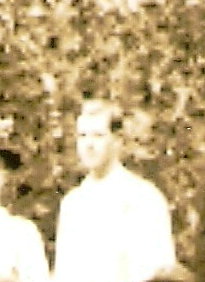
It is important to note that this image is of the Nay Dyer Pinegar,
a son of Benjamin Frandlin Pinegar and Sara Elizabeth DePriest Pinegar. This Nay Dyer Pinegar married Louella Cothran.Another Nay Dyer Pinegar preceded him.
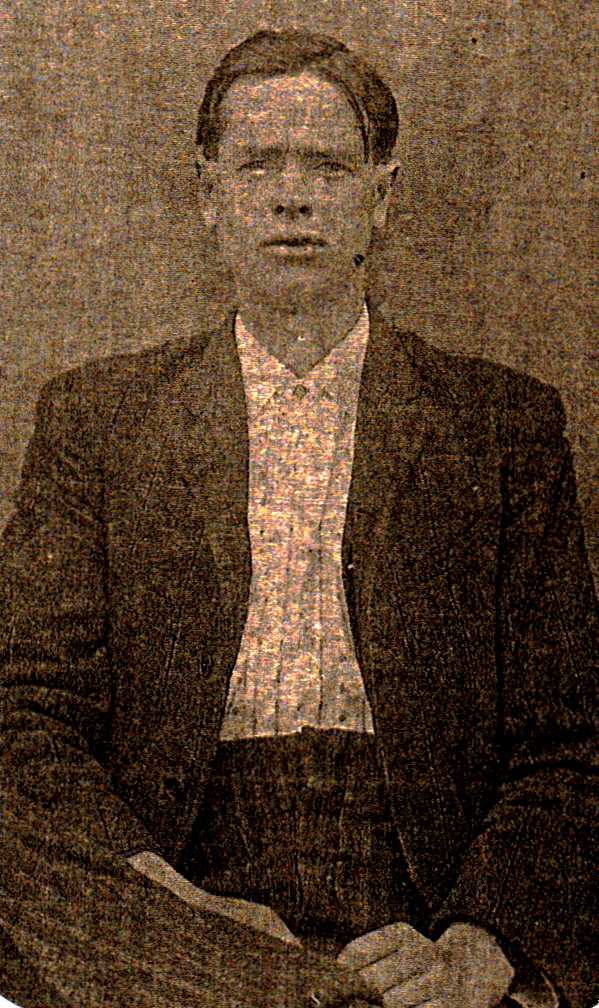
None of the Fulks family could have encountered Uncle Nay Dyer Pinegar without
asking questions about his own manhood. Never have I, George Fulks, encountered a man as physically strong or who loved labor as much as my greatuncle Dyer. The appointed guardian for his nephew and neice, Loretta and Benjamin Pinegar, Dyer was
born October 14,1884 and deceased May 9, 1966 in the between the rivers section of
Lyon County, Kentucky. Married to Louella Cothran, I recall Uncle Dyer's wife as being a very attractive, light-skinned, blond-haired, kind and cordial woman.
Sharing Uncle Dyer's love of farming and labor were his nephew Benjamin Pinegar
and the horse; a huge, black mare. Love for his horse exceeded Uncle Dyer's affection for man should one observe the kindness and affection shown towards that animal."There has never been a finer horse than this one," I heard my uncle comment.
During planting season and it was necessary to plow, my uncle would work from daylight to the lunchbell with just a jug of water and jerky and biscuit in a backback. Uncle Dyer and the horse were physically strong to the extent that neither
tired even in the very humid or frigid conditions. Nobody was as good a man as Uncle
Dyer Pinegar, and there was probably never a finer woman than his wife Louella.
When my dad and I
visited Lyon County Kentucky during Rummage Ira Fulks" annual leave, we would usually visit them twice during that thirty day vacation.Very often I would hear both Uncle Dyer and his wife comment, "we don't have much time for play here. The work here on the farm is awfully hard."
Resting for an hour during the plowing and planting season, Uncle Dyer would
continue to work in the field until near darkness. The last part of daylight would
be used to groom, feed, and show special treatment of the horse. There were special treats for the horse such as oats, corn, hay, and shelled corn along with kind words and affection. Carrying a whip but using it for noise effect was all that was
necessary to attain the best effort from the horse; and amazingly, the horse was sufficiently strong that it could have plowed for another day without rest. The horse also loved Uncle Dyer.
Following and during a part of the harvest season and into the frigid months of the winter, Uncle Dyer Pinegar would enter the forests and produce two railroad crossties daily with his sharp broadax. Such a feat required that he find a tree of
suitable height and diameter, remove the branches, and carefully chop the treetrunks
into two identical crossties. If they were not exactly correct, the railroad would not purchase the crossties. Then using his horse, Uncle Dyer would place the crossties on a large sled and pull them to the railroad yard twelve miles one way. He would leave the sled there at the the railroad yardand ride his mare back; arriving home three hours after darkness. Awakening the next day before daylight, it
was another work day for Uncle Dyer Pinegar.
Most rural Kentuckians during my lifetime raised swine, poultry, and kept a herd of cattle on their property; even on smaller farms of ten acres or less. Such was the case of Uncle Dyer, Aunt Louella Cothran Pinegar, and Cousins Benjamin and
Loretta Pinegar.
Carie Atlantic Gerthie Dell Pinegar, Grandmother of George Harold
Fulks, was born in Trigg County, Kentucky on March 20, 1888 and deceased January 13, 1959. Carie was married to Mattie Mandard Fulks, a son of Henry Andrew Jackson Fulks II and Nancy Emeline Mitchell Fulks. Mandard died at age 32 years. His death was caused by
snakebite. Carie and Mandard had four children: Rummage Ira, Herbert Buford, Seamer M., and Wilmus Avel.
Aunt Josie (Josephene Pinegar)born Jan 25, 1886, deceased Oct 8, 1950 at
Grand Rivers, Kentucky..married to John Lowe and Robert Lee Campbell. With Robert,
she had one child named Palmer Benjamin Pinegar who was born August 14,1914 and deceased on January 22,1948 in St. Louis, Missouri
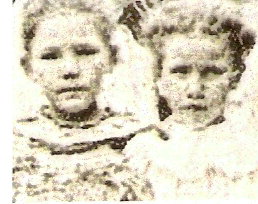
Within this image are Carie and Josie at ages 10 and 12 years. The photo was cut from a group lithigraph made of students attending Old Ironton School located in Trigg County, Kentucky. Year was 1900.
When the husband of Sara Elizabeth Depriest Pinegar deceased during 1887 or 88, she was pregnant with her youngest child, Lalus Martin Pinegar.(1889). Two brothers of Grandmother "Betty" were Sandy and Dick Depriest. Those brothers assumed responsibility in assisting her in operating the Benjamin Franklin Pinegar farm she inherited.
Selling her farm in the 1920's, Sara Elizabeth Depriest Pinegar
lived with different members of her family until she deceased in March, 1940.
=========================================================
AUNT JOSIE RETURNS TO KENTUCKY

It was during the summer of 1949 or 1950 that Rummage Ira, Ella Belle, and
George Fulks visited Uncle Lalus Pinegar in Grand Rivers, Kentucky. Learning that Aunt Josie Pinegar had returned to Grand Rivers, Kentucky after many years in St. Louis, Missouri, we were all excited about meeting our long lost Aunt Josie Pinegar. I'd listened to Grandmother Carie talk about how much she missed her sister, Josie.
Caries's son Rummage and his family visited Kentucky during Summer of 1949 while on vacation. We were on her farm near Golden Pond. My grandmother Carie asked my dad to take her to Grand Rivers to see her sister, Josie. I was nine or ten years old. It is recollected that my Aunt Josie Pinegar had bought property in Grand Rivers: a restaurant and motel not far from the Grand Rivers boatdock and near the center of
town. I recall that my aunt had a few fishing cabins rented; and that my dad and I
bought sandwiches at her restaurant.
Carie Fulks and Aunt Josie met there in Grand Rivers and had a joyful reunion. At that time, Aunt Josie appeared to suffer from stress; no doubt increased by the loss of her only son in 1948. My meeting with
Aunt Josie was very brief.
Anthology Of the Parallel
"I had a dream, George ; one very clear. It was something so real that I know it will come true." said Grandmother Carie. "I saw you there at Ironton when I was a child, and that was very real; not a dream at all. Everybody there saw you."
"What did you see in your dream, Mama?" I inquired.
"It was so very clear to me, "Mama said. "You were sitting behind
a small box writing with a typewriter on a thing that looked like a television set. You had written a lot about the family, and many pictures had been placed along with
the writing. I saw it and liked it. You had done a good job, and it pleased me that you had done so much. You had written good things about us. You will do that for your family, and I appreciate it so much."
A few days after Grandmother shared that conversation with me, a man came to her farm, picked my clothing and me up; then drove me to the college I
attended during Summer of 1958.
If you, my relatives, have anything you would like me to add to the Pinegar family history, please let me know by letter, phone 217-532-3883, or e-mail to: java40@consolididated.net
Another Private Conversation Woth Grandmother Carie
Quiet and non-pretentious, this writer was under temporaryy care of the Grandmother
we all called "Mama". Experiencing some apprehension that I would soon enter Murray State College as a student for the Summer semester, I did not feel well-prepared either socially or academically for reason that I'd been lazy in my studies at Charlton County Highschool. School was so easy to pass with little effort. I expected to fail in college,
During more than one conversation, my grandmother offered me advice and provided
guidance that were later beneficial. One particular session was most useful. "George," she said in her kindest and gentlest manner, "you're going to college to train to be a teacher, and if you pass, you'll be working with children.
I'd like to share with you some things about the teacher we had when we were children, and that might save you a lot of trouble".
"We had a good teacher, George," she continued. "We were taught many good things
that helped us later. Most of us who had that teacher learned to read, write, and do arithmetic. We were also taught history, the bible, and how to get along. We were glad to have that teacher because it was hard to get anyone to come and teach in an area as remote as we lived. We were taught some things we didn't need to learn, and we didn't tell anyone. We liked and appreciated that teacher, and we didn't want them to be hurt. The point I'm making, George, is be certain not to
do things to you students. Just teach the subjects, and you'll get along better.